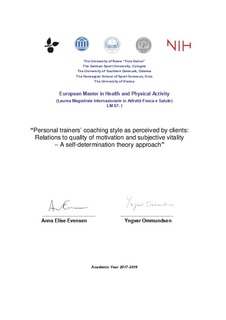Personal trainers’ coaching style as perceived by clients: Relations to quality of motivation and subjective vitality – A self-determination theory approach
Abstract
Introduction: The fitness center sector has rapidly increased as a facilitator for enhanced physical activity levels in the modern society. Personal trainers working in the industry stand in a unique position to impact their clients by guiding them towards individualized and efficient exercise, and importantly, motivate them to sustained adherence to physical activity. Consequently, it is an important and comprehensive profession in need of professionalized expertise about psychological, as well as physiological outcomes of their coaching. This study investigates how PTs should steer their coaching in order to most efficiently influence their clients’ long-term motivation.
Aim: Investigating clients’ perception of personal trainers’ coaching style in relation to motivational regulation and subjective vitality through a cross-sectional study, based on the self-determination theory.
Methods: 127 individuals currently undergoing personal training sessions were recruited to participate in a survey capturing perceived coaching behavior, motivational regulation and subjective vitality. Step-wise regression analyses and Structural Equation Modeling were conducted to investigate relations between variables and potential mediation effects from motivational regulation.
Results: Perceived need supportive coaching, that is, autonomy, competence and relatedness, positively affected subjective vitality in clients, fully or partially mediated by motivational regulation. Oppositely, controlling tendencies in coaching negatively influenced subjective vitality, partially mediated by motivational regulation. Furthermore, nuances of controlling coaching were found, revealing differentiating effects on vitality.
Conclusion: Personal trainers should emphasize need supportive coaching in order to positively impact clients’ motivational regulation and vitality during exercise, likely leading to long-term adherence to physical activity and exercise.
Description
Masteroppgave - Norges idrettshøgskole, 2019
